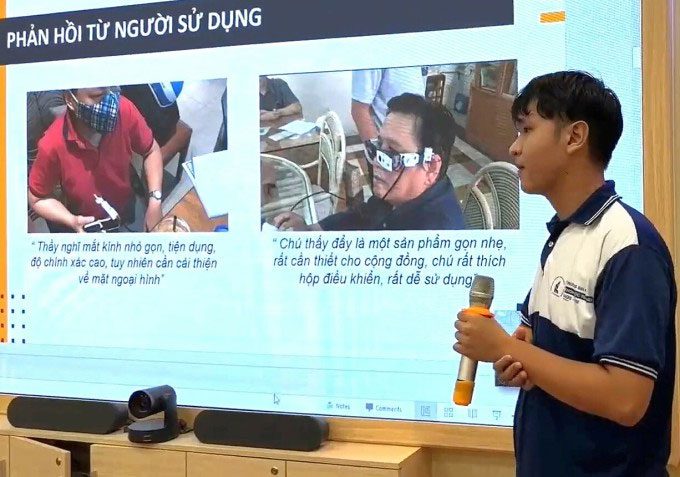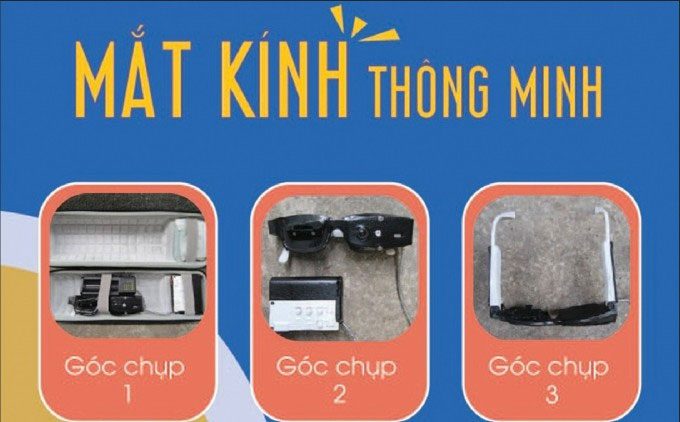This is a brilliant idea from a group of information technology students in Ho Chi Minh City, utilizing artificial intelligence (AI) to convert text into speech. This innovation aims to assist visually impaired individuals in reading books more easily by allowing them to listen to books instead of reading by hand.
The product was developed by Trịnh Quốc Huy (University of Science, Ho Chi Minh City) and Phạm Huy (FPT University, Hanoi), along with several other team members, with the goal of providing the visually impaired with access to knowledge through a compact device that integrates multiple functions.
The idea of creating glasses for the visually impaired was sparked by Trịnh Quốc Huy (the team leader) back in 2019 when he was still in high school. The student wanted to develop a technological product for his grandmother, who is visually impaired. Initially, Huy intended to create navigation glasses to help his grandmother move around without needing a cane. However, this type of glasses exhibited limitations, as it could incorrectly alert the user about small or moving objects.
According to Huy, technology can still have errors. If such errors occur while a visually impaired person is navigating traffic, it could pose a serious risk to their life. At that point, he thought about developing glasses to assist with reading.
Regarding this shift in focus, Huy believes that technology can help visually impaired individuals overcome their insecurities and access knowledge like everyone else, enabling them to work and become contributing members of society.

Quốc Huy introduces smart glasses for the visually impaired at the AI Solutions Competition in Ho Chi Minh City, 2022. (Photo: Organizer).
Along with the participation of many AI-enthusiastic students, the first version of the smart glasses was launched in 2021. The glasses are made from PLA plastic and weigh about 50 grams. They are equipped with a camera that captures text and a sound circuit that produces speech. In addition to reading text, the glasses can recognize currency and function as a voice assistant. These features are integrated into buttons on a compact control box for easy use by the visually impaired as per their needs.
According to Quốc Huy, the key factor determining the effectiveness of the glasses is the AI-powered image processing algorithm that enhances the accuracy of text reading from the camera data. Beyond reading books, when visually impaired users direct the glasses towards areas with text in their surroundings, the camera captures images, recognizes the text, and converts it to speech. This helps them visualize a portion of their environment.
“This feature is useful when visually impaired individuals visit new places, even helping them know where they are through images from nearby signs and advertisements. This functionality greatly aids them in case they get lost,” Huy shared. The team’s model can read text with up to 90% accuracy, using Google’s free text-to-speech tool. The team plans to develop a dedicated Vietnamese text-to-speech system tailored to different regional dialects to better serve users in the future.

Image of the smart glasses developed by the research team. (Photo: Organizer).
The product has been tested with about 10 visually impaired individuals in Ho Chi Minh City and Lâm Đồng, receiving positive feedback for its text reading accuracy, lightweight design, and ease of use. However, some opinions noted that the glasses are not aesthetically pleasing and that the text reading speed is slow.
Huy mentioned that the team is working on improving the product based on this feedback for future versions. “We hope organizations and businesses will support us to enhance the product, allowing for mass production to serve users better,” Huy said. Currently, the production cost for one pair of smart glasses is approximately 4.5 to 5 million VND, but it would be cheaper if produced on an industrial scale.
According to Associate Professor Dr. Thoại Nam, Director of the Computing Engineering Center at Ho Chi Minh City University of Technology, the smart glasses created by the team have high applicability and carry humanitarian value by addressing the needs of vulnerable individuals in society, helping them access knowledge and information. However, the glasses are still in the technology refinement stage and require further improvements for effective use.
Professor Nam suggested that the glasses need to continuously transmit data while in use, so the team should research energy-efficient wireless transmission technologies to extend battery life. “Additionally, the camera on the glasses should be of a specialized type suited for the intended purpose of the team,” he stated.


















































